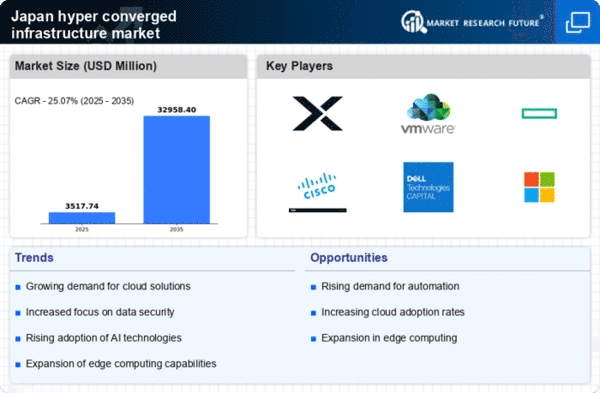Rising Demand for Scalability
The hyper converged-infrastructure market in Japan is experiencing a notable surge in demand for scalable solutions. As organizations increasingly seek to expand their IT capabilities without incurring excessive costs, hyper converged infrastructure offers a compelling solution. This market segment is projected to grow at a CAGR of approximately 25% over the next five years, driven by the need for flexible and scalable IT environments. Companies are looking to optimize their resources and reduce operational complexities, which hyper converged solutions facilitate effectively. The ability to scale resources up or down based on demand is particularly appealing to businesses in Japan, where agility and responsiveness are critical in a competitive landscape. This trend indicates a shift towards more adaptable IT frameworks, positioning hyper converged infrastructure as a key player in the evolving technological landscape.
Increased Focus on Data Management
In the hyper converged-infrastructure market, the emphasis on effective data management is becoming increasingly pronounced. As data volumes continue to escalate, organizations in Japan are seeking solutions that not only store but also manage data efficiently. Hyper converged infrastructure provides integrated data management capabilities, enabling businesses to streamline their data operations. This is particularly relevant in sectors such as finance and healthcare, where data integrity and accessibility are paramount. The market is projected to witness a growth rate of around 20% as companies prioritize solutions that enhance data governance and compliance. The ability to manage data seamlessly across various platforms is a critical factor driving the adoption of hyper converged infrastructure, as organizations aim to leverage their data assets for strategic decision-making.
Regulatory Compliance and Security Needs
The hyper converged-infrastructure market is significantly influenced by the growing need for regulatory compliance and enhanced security measures. In Japan, businesses are increasingly aware of the importance of safeguarding sensitive data against cyber threats and ensuring compliance with stringent regulations. Hyper converged infrastructure offers built-in security features that help organizations meet these requirements effectively. As data breaches become more prevalent, the demand for secure IT environments is intensifying. Companies are likely to invest in hyper converged solutions that provide robust security protocols and compliance capabilities. This trend is expected to drive market growth, as organizations prioritize solutions that not only enhance operational efficiency but also protect their data assets. The intersection of security and compliance needs with hyper converged infrastructure is shaping the future of IT in Japan.
Cost Efficiency and Resource Optimization
Cost efficiency remains a pivotal driver in the hyper converged-infrastructure market. Organizations in Japan are increasingly recognizing the financial benefits associated with adopting hyper converged solutions. By consolidating storage, computing, and networking into a single system, companies can significantly reduce capital expenditures and operational costs. Reports suggest that businesses can achieve up to 40% savings in total cost of ownership when transitioning to hyper converged infrastructure. This financial incentive is particularly attractive in a market where budget constraints are prevalent. Furthermore, the resource optimization capabilities of hyper converged systems allow for better utilization of existing assets, leading to enhanced productivity. As organizations strive to maximize their return on investment, the hyper converged-infrastructure market is likely to see continued growth fueled by these cost-saving advantages.
Technological Advancements and Innovation
Technological advancements play a crucial role in shaping the hyper converged-infrastructure market. Innovations in hardware and software are driving the evolution of hyper converged solutions, making them more efficient and user-friendly. In Japan, companies are increasingly adopting cutting-edge technologies such as artificial intelligence and machine learning to enhance their hyper converged infrastructure capabilities. These advancements not only improve performance but also enable predictive analytics and automation, which are essential for modern IT environments. The market is expected to grow as organizations seek to leverage these innovations to stay competitive. Furthermore, the integration of advanced technologies into hyper converged solutions is likely to attract a broader range of customers, from small businesses to large enterprises, thereby expanding the market landscape.















